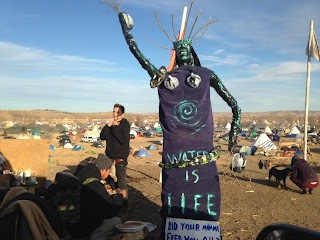BISMARCK, N.D. (AP) — The U.S. Army Corps of Engineers has set an early December deadline for American Indians and others to leave an encampment in North Dakota where they’ve been entrenched for months protesting the Dakota Access pipeline. Tribes including the Standing Rock and Cheyenne River Sioux are fighting the Dakota Access project because they fear it will harm drinking water and cultural sites. Texas-based pipeline developer Energy Transfer Partners says the 1,200-mile pipeline through the Dakotas, Iowa and Illinois will be safe.
Here’s a guide to the latest developments and key background about the protest:
EVICTION NOTICE
The Corps said last week in a letter to Standing Rock Sioux tribal leader Dave Archambault that all federal lands north of the Cannonball River will be closed to public access Dec. 5 for “safety concerns.” The order includes the sprawling encampment called Oceti Sakowin, or Seven Council Fires camp, that’s a living protest against the four-state $3.8 billion pipeline.
More


9 comments:
Hopefully Trump will send them all back where they came from.
Nice propaganda piece. Funny how they did not mention that they set up a "free speech" area. Really? They need a free speech area? Isn't free speech a right?
733
Who would Mr. Trump send back to where they came?
The oil companies?
The NATIVES? (get it? Native Americans)
Another wounded knee
7:33 u sound like the idiot I work with. The one that doesn't have a clue what he is talking about.
Looks like pretty much everyone gets sarcasm except 10:21 and 11:27.
Anonymous Anonymous said...
Hopefully Trump will send them all back where they came from.
November 28, 2016 at 7:33 PM
Nobody can send anyone back to where they came from if they don't want to go, and I don't think the water protectors want to go anywhere. I don't think their requests are unreasonable at all. I'm no engineer but how hard would it be to put a couple of 45-degree couplings in the pipeline and go around the water and the controversy? And a free speech zone? I cringe every time I hear that phrase. It's not like pipelines never leak or break. It happens all the time. Just ask Shell Oil. They have already paid out millions for a spill and are still being sued in a London court.
Emere Godwin Bebe Okpabi, leader of Nigeria's Ogale people, unpacked four bottles of water from his homeland and lined them up on a table to show why his subjects are suing Royal Dutch Shell in a London court.
The Nigerian water is contaminated with oil and cancer-causing compounds such as benzene. It is what his people drink every day.
Lawyers for more than 40,000 Nigerians are demanding action from Shell to clean up oil spills.
Britain's High Court began hearing lawsuits on Tuesday filed by the Ogale and Bille people alleging that decades of oil spills have fouled the water and destroyed the lives of thousands of fishermen and farmers in the Niger River Delta, where a Shell subsidiary has operated since the 1950s.
They brought their fight to Shell's home base because they say the Nigerian courts are too corrupt.
London law firm Leigh Day is handling the cases after it won a landmark agreement from Shell to pay $83.5m in compensation to the Bodo community for damage caused by oil spills in 2008 and 2009.
Shell originally offered $50,000 before the Bodo took their case to the same UK court.
The new lawsuits were brought by two communities located in Ogoniland, part of the oil-rich southern Niger River Delta.
They want to hold Shell, incorporated in the UK, responsible for the actions of its Nigerian subsidiary, Shell Petroleum Development Company of Nigeria Ltd, or SPDC.
The subsidiary said it has produced no oil or gas in the region since 1993.
Shell was the first oil company to operate in Nigeria, starting production in 1958.
In the 1990s, the military government sent armed troops to put down protests by the Ogoni people, turning the oil-producing south into a war zone.
One of the leaders of those protests was Ken Saro-Wiwa, a writer and environmental activist whose opposition helped stop Shell's production in Ogoniland.
He and eight others were hanged by the government of military dictator Sani Abacha in November 1995 in a case the US condemned.
In a 2011 report, the United Nations said in at least 10 communities in Ogoniland, public health was "seriously threatened" by drinking water contaminated with hydrocarbons.
In one area, the water contained the carcinogen benzene at levels 900 times higher than what the World Health Organization says is safe.
While the report recognised that oil production in the region had ceased, it criticised Shell's oversight of the remaining facilities.
And that is why nobody should be sent anywhere.
Anonymous Anonymous said...
Looks like pretty much everyone gets sarcasm except 10:21 and 11:27.
November 29, 2016 at 12:25 AM
Because maybe there was no sarcasm until you were called out and tried to back peddle?
Build a pipe line a hundred times stronger than it has to be and send the protesters away.
Post a Comment